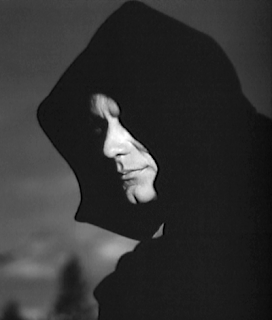It's also about the uncertainties of faith, the keynote being whether or not redemption will be found in the afterlife, if it exists at all. A servant (Gunnar Bjornstrand) who potters around in the film like a wiser version of Baldrick, often represents this more cynical yet amusingly caustic side.
The period of the story is not specifically referred to, but can roughly be assumed to be the 14th century, the time of the Black Death. The characters have a splendidly allegorical feel to them which is never overplayed, making them much more real and believable as a result. Read into them what you will: the main character is Antonius Bloch, played by Max Von Sydow, a knight returning from the Crusades, and on something of an idealogical mission, both before and after his adventures; in some ways this predates Von Sydow's casting as Jesus in The Greatest Story Ever Told, and his later very successful role as The Exorcist.
Bloch also has a certain amount of Hamlet-like stature and gallant uncertainty about him - one of several Shakespeare influences in Bergman's tale. There is also a travelling theatrical troupe heading towards Elsinore (but warned off from going there!), headed mostly by a young couple named "Mia" (Bergman regular Bibi Andersson) and "Jof" (Nils Poppe) - and of course, they have a newly born child (by immaculate conception?) whom they steer through the wilderness whilst others are dying all around - for good measure, Jof also sees a vision of the Virgin Mary helping baby Jesus (we assume) to take his first steps. Other characters are victims of the time; suspected witches, blamed for the spreading of the plague, or temptresses, led by - or indeed leading - equally frustrated men astray.

And then there is Death of course, played memorably by Bengt Ekerot, and his game of chess with Antonius Bloch: a scene much imitated since - directly sent up in Bill and Ted's Bogus Journey, and even popping up in Last Action Hero - but the character, for all its over-familiarity nowadays, is still a very scary and effective image, resonant in so many artistic forms over the centuries, from Dickens' Ghost of Christmas Yet To Come, to the Emperor in Return of the Jedi. In most of these cases, Death is an omnipresent, sinister, yet oddly blank figure, and portrayed here with a brilliantly simple but effective chalk-white face covered with a sinister black cloak. Much of Bergman's film is photographed in this haunting black-or-white style - if ever a film was suited to monochrome, it is The Seventh Seal.
Other quirky scenes seem to belie the notion that Bergman is a "Heavy" director. The subject is certainly a dark one, but that does not mean that his films are without amusing moments. There is one blackly comic moment where a travelling actor, discovered in an affair with a blacksmith's wife, decides to "act" his own death in order to fool the blacksmith, and then hides up in a tree, only to find Death walking right behind him with a saw, in order to chop the tree down!
I first saw the film in its entirety on video in the autumn of 1999, a suitably appropriate time, with lots of foreboding about apocalyptic "Millennium Bug" threats leading up to 2000. Seeing it again just recently at the Norwich Playhouse (the temporary stand-in venue for Cinema City during redevelopment), the film seems just as relevant today, and has lost none of its potency 50 years after it was made.
One of the most famous moments from the film is at the end, when "the seventh seal" (referred to in the Book of Revelation) is opened, and Heaven was silent "for half an hour" - or in this case, the six figures who face Death, as he leads them up the hill (improvised by Bergman with seven volunteers in the distance instead of the original actors) to the dance of death: the knight, his wife, his servant, the blacksmith and his wife, and a strangely mute girl (Gunnel Lindblom) who has just one line in the entire film, but quite a telling one.
Bergman leaves the audience to make up their own minds about its Christian symbolism. The only certainty in the story - and in life - is death. So beyond that, is there, as Bloch wonders, true salvation in life after death? Or is it all just illusion and fakery?
If the life thereafter and dreams of Heaven and Hell are just illusions of whimsical fantasy, and not scientific reality, then as Orson Welles once said (in the last film he directed F for Fake): "go on singing."
When Ingmar Bergman passed away on July 30th this year, I hope there were angels singing for him up in Heaven, and even if there weren't, there were still plenty down here on Earth to sing for him anyway.
 Olivier's opportunity was a golden one, and he took it with both hands, and although his resources were often
Olivier's opportunity was a golden one, and he took it with both hands, and although his resources were often 
